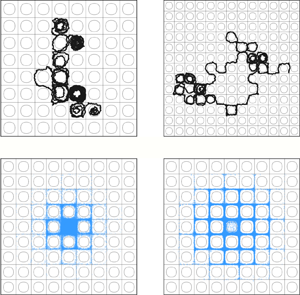Published online by Cambridge University Press: 17 September 2020

We investigate the transport of inertial particles by cellular flows when advection dominates over inertia and diffusion, that is, for Stokes and Péclet numbers satisfying  $St \ll 1$ and
$St \ll 1$ and  $Pe \gg 1$. Starting from the Maxey–Riley model, we consider the distinguished scaling
$Pe \gg 1$. Starting from the Maxey–Riley model, we consider the distinguished scaling  $St \, Pe = O(1)$ and derive an effective Brownian dynamics approximating the full Langevin dynamics. We then apply homogenisation and matched-asymptotics techniques to obtain an explicit expression for the effective diffusivity
$St \, Pe = O(1)$ and derive an effective Brownian dynamics approximating the full Langevin dynamics. We then apply homogenisation and matched-asymptotics techniques to obtain an explicit expression for the effective diffusivity  $\bar {D}$ characterising long-time dispersion. This expression quantifies how
$\bar {D}$ characterising long-time dispersion. This expression quantifies how  $\bar {D}$, proportional to
$\bar {D}$, proportional to  $Pe^{-1/2}$ when inertia is neglected, increases for particles heavier than the fluid and decreases for lighter particles. In particular, when
$Pe^{-1/2}$ when inertia is neglected, increases for particles heavier than the fluid and decreases for lighter particles. In particular, when  $St \gg Pe^{-1}$, we find that
$St \gg Pe^{-1}$, we find that  $\bar {D}$ is proportional to
$\bar {D}$ is proportional to  $St^{1/2}/(\log ( St \, Pe))^{1/2}$ for heavy particles and exponentially small in
$St^{1/2}/(\log ( St \, Pe))^{1/2}$ for heavy particles and exponentially small in  $St \, Pe$ for light particles. We verify our asymptotic predictions against numerical simulations of the particle dynamics.
$St \, Pe$ for light particles. We verify our asymptotic predictions against numerical simulations of the particle dynamics.